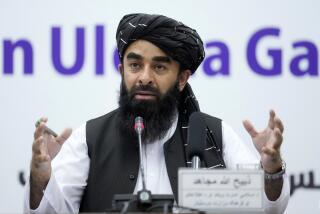Security for More Afghans
- Share via
The attempted assassination of Afghanistan’s defense minister this week provided the latest and most dramatic example of the need to expand the international security force to cities outside Kabul, the capital.
The 4,500 troops from Britain, France and other countries have brought relative peace to Kabul, allowing adults to shop and visit and children to walk to reopened schools without fear. Washington originally did not want international peacekeepers in Afghanistan at all, despite their success in enforcing truces in such places as Bosnia and Kosovo, and has not supplied U.S. troops to the force. But eventually the Bush administration agreed to the international soldiers, so long as they came under U.S. Central Command jurisdiction.
Unfortunately, the Pentagon opposes letting the peacekeepers take up posts in Herat, Mazar-i-Sharif and Jalalabad, where a bomb just killed five people and narrowly missed killing Defense Minister Mohammed Qassim Fahim. The regional security troops, untrained and inept, were useless in preventing the attack, helping the injured or getting Fahim and his entourage to safety quickly. There is no guarantee that NATO soldiers would have prevented the explosion or avoided taking casualties, but their neutrality, combined with superior training and equipment, would give them better odds in such situations.
The Pentagon says its soldiers are fighters, not nation-builders. In Afghanistan the picture is not that simple. U.S. officials say American troops have been forced at least 10 times to intervene between rival Afghan warlords, actions that could have been taken by peacekeepers. The eventual goal is to have an Afghan army to provide security, but it is likely to take several years to train that force. The immediate need is providing security in wider areas of the country to reduce the role of warlords and clear a path for aid to a population devastated by a 10-year Soviet occupation, years of brutal combat among many of the same warlords, and rule by the Taliban. Even pared-down forces of hundreds of soldiers would be helpful in cities outside Kabul.
Another need is paying those Afghan police officers and soldiers who are trying to provide a semblance of order. Some may be little more than thugs, but paying and training them is better than letting them use their weapons to extort money at checkpoints or protect farmers almost ready to harvest their opium poppies. The government of interim Prime Minister Hamid Karzai, desperate for funds, has not been able to pay farmers enough to persuade them to forgo money earned from the opium, which gets converted to heroin.
Karzai wants more peacekeepers. Other Afghan officials are interpreting U.S. opposition as a desire to get out as soon as possible. Washington turned its back on the country after the Soviets were ousted in 1989, opening the door for internecine warfare and eventually the Taliban, Al Qaeda and Sept. 11. That mistake must not be repeated.
More money and more supplies need to be provided. Quickly. And that depends on security for a much greater area than just the capital.
More to Read
Sign up for Essential California
The most important California stories and recommendations in your inbox every morning.
You may occasionally receive promotional content from the Los Angeles Times.










